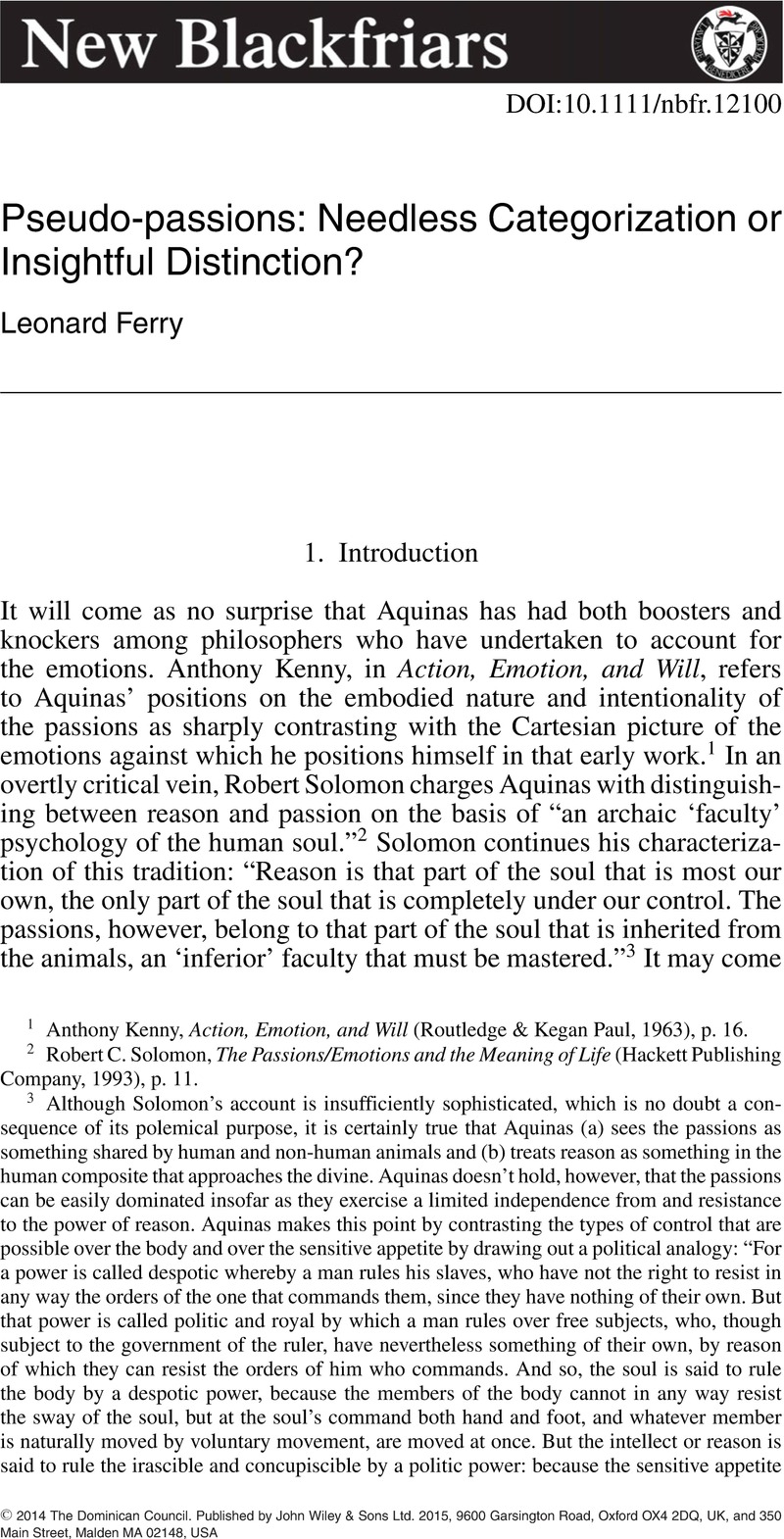No CrossRef data available.
Article contents
Pseudo-passions: Needless Categorization or Insightful Distinction?
Published online by Cambridge University Press: 01 January 2024
Abstract

- Type
- Original Article
- Information
- Copyright
- Copyright © 2014 The Dominican Council. Published by John Wiley & Sons Ltd.
References
1 Kenny, Anthony, Action, Emotion, and Will (Routledge & Kegan Paul, 1963), p. 16.Google Scholar
2 Solomon, Robert C., The Passions/Emotions and the Meaning of Life (Hackett Publishing Company, 1993), p. 11Google Scholar.
3 Although Solomon's account is insufficiently sophisticated, which is no doubt a consequence of its polemical purpose, it is certainly true that Aquinas (a) sees the passions as something shared by human and non-human animals and (b) treats reason as something in the human composite that approaches the divine. Aquinas doesn't hold, however, that the passions can be easily dominated insofar as they exercise a limited independence from and resistance to the power of reason. Aquinas makes this point by contrasting the types of control that are possible over the body and over the sensitive appetite by drawing out a political analogy: “For a power is called despotic whereby a man rules his slaves, who have not the right to resist in any way the orders of the one that commands them, since they have nothing of their own. But that power is called politic and royal by which a man rules over free subjects, who, though subject to the government of the ruler, have nevertheless something of their own, by reason of which they can resist the orders of him who commands. And so, the soul is said to rule the body by a despotic power, because the members of the body cannot in any way resist the sway of the soul, but at the soul's command both hand and foot, and whatever member is naturally moved by voluntary movement, are moved at once. But the intellect or reason is said to rule the irascible and concupiscible by a politic power: because the sensitive appetite has something of its own, by virtue whereof it can resist the commands of reason. For the sensitive appetite is naturally moved, not only by the estimative power in other animals, and in man by the cogitative power which the universal reason guides, but also by the imagination and sense. Whence it is that we experience that the irascible and concupiscible powers do resist reason, inasmuch as we sense or imagine something pleasant, which reason forbids, or unpleasant, which reason commands”(ST I 81, 3ad2).
4 Miner, Robert, Thomas Aquinas on the Passions (Cambridge University Press, 2009), p. 1CrossRefGoogle Scholar.
5 Aquinas reminds us in the first article of this question that “every appetitive movement or inclination consequent to apprehension, belongs to the intellective or sensitive appetite: since the inclination of the natural appetite is not consequent to an apprehension of the subject of that appetite”(ST I-II 35, 1).
6 King, Peter, “Aquinas on the Passions,” in Thomas Aquinas/Contemporary Philosophical Perspectives, ed. Davies, Brian (Oxford University Press, 2002), p. 378, n. 7Google Scholar. The essay was originally published in Aquinas’ Moral Theory: Essays in Honor of Norman Kretzmann, ed. Macdonald, Scott and Stump, Eleonore (Cornell University Press, 1999)Google Scholar.
7 Unless otherwise stated, the translation used is the Summa Theologica, translated by the Fathers of the English Dominican Province, in five volumes (Christian Classics, reprinting in 1981 of the revised edition issued by Benziger Brothers in 1948), ST I 19, 11.
8 See ST I-II 22, 3.
9 Keep in mind that Aquinas has already, in the preceding article, established that the passions belong to appetite rather than apprehension.
10 Interestingly, Aquinas refers to the following passage from Augustine's City of God (ix.5) in support of his position: “The holy angels feel no anger while they punish…, no fellow-feeling with misery while they relieve the unhappy: and yet ordinary human speech is wont to ascribe to them also these passions by name, because, although they have none of our weakness, their acts bear a certain resemblance to ours.”
11 Roberts, Robert C., “Thomas Aquinas on the Morality of Emotions,” History of Philosophy Quarterly 9, 3 (July 1992): 287Google Scholar.
12 I have pointed out that in one sense Aquinas does this in the case of the pseudo-passions, but it is evident that Roberts does not have a limited class of experiences that are similar to the passions in mind. He thinks that passions properly speaking are inadequately accounted for by Aquinas’ theory.
13 “The emotion itself is typically determined by concepts available only via the intellect. The standard emotions of human beings are basically rational, not just derivatively, but intrinsically”(294).
14 See also: “The notion of an emotion (e.g. an episode of anger) “intrinsically considered,” which human beings have in common with animals that are incapable of possessing the concepts of justice and desert, and which, because of its independence of reason, does not take moral predicates, is a fiction. It is a fiction because (as Aquinas himself holds) emotions are identified by their objects and the objects of anger (a person who has done me an injustice, a punishment that he deserves) are accessible only through reason”(293).
15 Indeed, this is his first objection to Aquinas’ theory: “My first objection to assimilating emotions to movements of the sensory appetite was that the objects of emotions are not always represented sensorily or in sensory-like images”(293).
16 Roberts faults Aquinas for under-estimating the powers of non-human animals: “Perhaps Aquinas's account slights animals’ minds; maybe dogs do have some rudimentary concept of the future, which enables them to have genuine expectations and thus perhaps an emotion a bit like human hope. But if they do have this, it is in virtue of having something like human reason”(294).




